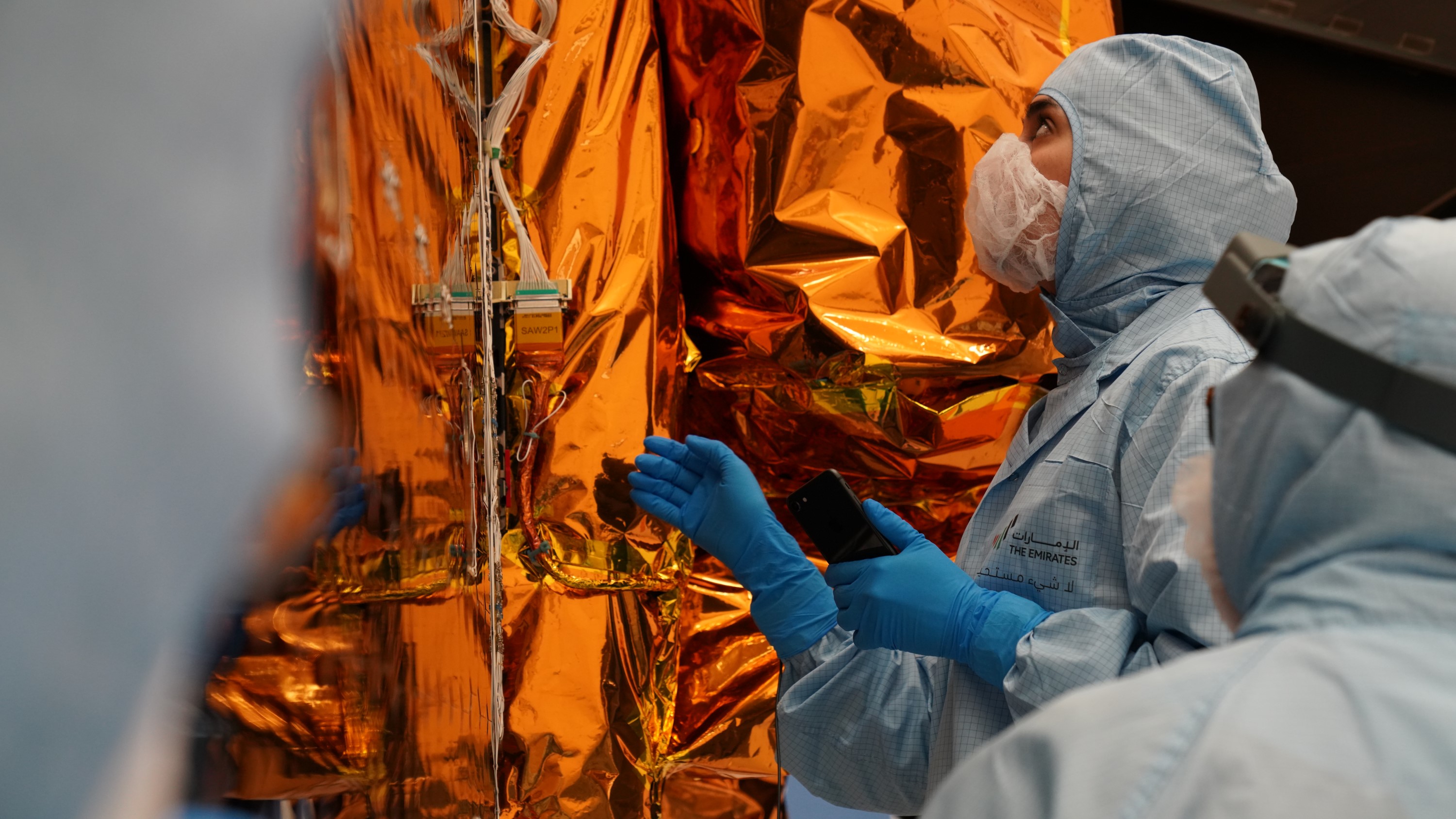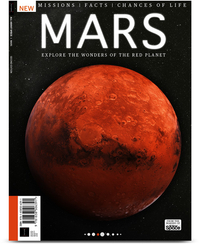UAE's Hope mission is about to reach Mars and the stakes are high
This is the moment the UAE has been waiting for.

Tomorrow, history and the hopes of the Arab world will hang on the endurance and independence of six engines charged with steering an SUV-sized spacecraft into orbit around Mars.
The United Arab Emirates (UAE) launched that spacecraft, dubbed Hope, in July 2020, lofting its first interplanetary mission a little more than a decade after becoming a spacefaring nation at all. Now, after a smooth seven-month cruise, the UAE is preparing for Hope's arrival at the Red Planet on Feb. 9. It's a complex maneuver that requires the spacecraft to complete an intense engine burn with no support from the mission's engineers, who are left anxiously awaiting bulletins that the solar system's geometry delays by 10 minutes.
"What that means is 27 minutes of burning fuel, of using our thrusters, of the spacecraft undergoing one of the toughest challenges that it's been designed for," Sarah Al Amiri, chairperson of the UAE Space Agency, said during a virtual event hosted on Feb. 1 by the U.S.-UAE Business Council, a nonprofit organization based in Washington, D.C.
Related: The United Arab Emirates' Hope mission to Mars in photos
Q&A: Why the UAE's Hope Mars mission's arrival is 'super exciting'
Book of Mars: $22.99 at Magazines Direct
Within 148 pages, explore the mysteries of Mars. With the latest generation of rovers, landers and orbiters heading to the Red Planet, we're discovering even more of this world's secrets than ever before. Find out about its landscape and formation, discover the truth about water on Mars and the search for life, and explore the possibility that the fourth rock from the sun may one day be our next home.
Formally called Mars Orbit Insertion, tomorrow's milestone will allow the Hope team to turn its focus to science while making the UAE the fifth entity to orbit the Red Planet. (NASA, the Soviet Union, the European Space Agency and India have preceded it; China will attempt to join the exclusive club just a day later with its Tianwen-1 mission.)
"The UAE has led the Arab world to new frontiers in deep space for the first time in history," Mohammed bin Rashid Al Maktoum, vice president and prime minister of the UAE and ruler of the Emirate of Dubai, said in a statement. "Our space mission carries a message of hope and confidence in Arab youth."
Hope is a mission for those youth, who demographically dominate in the UAE and the Middle East, Al Amiri has emphasized throughout the spacecraft's journey. "Youth were being used and radicalized within the region," she said. "People just wanted opportunities and wanted to be able to apply themselves positively for growth."
Get the Space.com Newsletter
Breaking space news, the latest updates on rocket launches, skywatching events and more!
Related: The UAE wants to rewrite what we know about weather on Mars

Space exploration made an appealing rallying cry. "This is what space is all about; it takes out of it the context of nationality background," Al Amiri said. "You become a species more than anything else."
And although Hope is a science mission, the data it will gather has never been the UAE's top priority. The country, which marks its 50th anniversary this year, built its economy on oil. But oil won't last, and the longer it does, the more havoc the climate crisis will wreak on the hot and arid UAE.
The nation's leaders did the math, eyed its then-skimpy science and technology sectors, and looked to the heavens. Mars sparkled: At the Red Planet, UAE leaders saw an opportunity to inspire its citizens and invest in technical skills that would stretch far beyond oil.
Mars also has special relevance in an era of climate change, Al Amiri noted at the virtual event. "Mars makes more sense to explore and to understand, especially the more we want to understand climate change, the more we want to understand how other planets in our solar system evolve, especially those that look like us," she said. "The only place that we're able to look at [as], perhaps, in some form, a future of Earth, is our next-door neighbor."
Although coronavirus case counts in the UAE have only risen since Hope's launch, the pandemic is no argument to back away from space exploration, Al Amiri said. Mission personnel who designed the spacecraft with international collaborators in part over Zoom long before the pandemic began were ready for some of the challenges of remote work.
"2020 has given us a heightened, even, sense of awareness of what needs to happen," she said. "As much as the time has been challenging … it has taught us as a nation how to be more resilient."
Alas, resilience alone won't see Hope through its crucial maneuver tomorrow; the mission will need some good fortune as well. Hope's engineers have practiced the maneuver as much as they can, on Earth and during the spacecraft's cruise, Al Amiri said, but nothing can match the reality of Mars orbit insertion.
Related: The boldest Mars missions in history

Half of Mars missions fail, after all, many of them here. "We knew the stakes entering into this; we knew it from the very first day we started working on this program," Al Amiri said at a separate preview event hosted on Jan. 28 by the University of Colorado Boulder's Laboratory for Atmospheric and Space Physics, a leading partner on the mission. "It's not something that we've shied away from."
To succeed, Hope's six engines must burn half the spacecraft's fuel in 27 minutes to slow the probe from 75,000 mph to 11,000 mph (121,000 kph to 18,000 kph). Mission personnel can't do anything during the maneuver but watch.
If something goes wrong, at best, Hope will stumble onto a new and fruitless path around the sun. And back on Earth? "We continue on," Al Amiri said of the UAE's space agency, which is already planning a technology mission to the moon and putting a century-long Mars strategy in place.
"It's not a one-off program; it is not something that you quit after," she said. "We've had a taste of planetary exploration, and I think we will continue delving in for more."
Email Meghan Bartels at mbartels@space.com or follow her on Twitter @meghanbartels. Follow us on Twitter @Spacedotcom and on Facebook.
Join our Space Forums to keep talking space on the latest missions, night sky and more! And if you have a news tip, correction or comment, let us know at: community@space.com.

Meghan is a senior writer at Space.com and has more than five years' experience as a science journalist based in New York City. She joined Space.com in July 2018, with previous writing published in outlets including Newsweek and Audubon. Meghan earned an MA in science journalism from New York University and a BA in classics from Georgetown University, and in her free time she enjoys reading and visiting museums. Follow her on Twitter at @meghanbartels.










